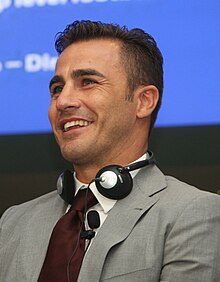
Back فابيو كانافارو Arabic فابيو كانافارو ARZ Fabio Kannavaro Azerbaijani فابیو کاناوارو AZB Фабіа Канавара Byelorussian Фабіё Канавара BE-X-OLD Фабио Канаваро Bulgarian ফ্যাবিও ক্যানাভারো Bengali/Bangla Fabio Cannavaro BS Fabio Cannavaro Catalan
 Cannavaro in 2011 | ||||||||||||||||||||||||||||||||
| Personal information | ||||||||||||||||||||||||||||||||
|---|---|---|---|---|---|---|---|---|---|---|---|---|---|---|---|---|---|---|---|---|---|---|---|---|---|---|---|---|---|---|---|---|
| Full name | Fabio Cannavaro[1] | |||||||||||||||||||||||||||||||
| Date of birth | 13 September 1973 | |||||||||||||||||||||||||||||||
| Place of birth | Naples, Italy | |||||||||||||||||||||||||||||||
| Height | 1.76 m (5 ft 9 in)[2] | |||||||||||||||||||||||||||||||
| Position(s) | Centre-back | |||||||||||||||||||||||||||||||
| Youth career | ||||||||||||||||||||||||||||||||
| 1988–1992 | Napoli | |||||||||||||||||||||||||||||||
| Senior career* | ||||||||||||||||||||||||||||||||
| Years | Team | Apps | (Gls) | |||||||||||||||||||||||||||||
| 1991–1995 | Napoli | 58 | (1) | |||||||||||||||||||||||||||||
| 1995–2002 | Parma | 212 | (5) | |||||||||||||||||||||||||||||
| 2002–2004 | Inter Milan | 50 | (2) | |||||||||||||||||||||||||||||
| 2004–2006 | Juventus | 74 | (6) | |||||||||||||||||||||||||||||
| 2006–2009 | Real Madrid | 94 | (0) | |||||||||||||||||||||||||||||
| 2009–2010 | Juventus | 27 | (0) | |||||||||||||||||||||||||||||
| 2010–2011 | Shabab Al Ahli | 16 | (2) | |||||||||||||||||||||||||||||
| Total | 531 | (16) | ||||||||||||||||||||||||||||||
| International career | ||||||||||||||||||||||||||||||||
| 1993–1996 | Italy U21 | 21 | (0) | |||||||||||||||||||||||||||||
| 1997–2010 | Italy | 136 | (2) | |||||||||||||||||||||||||||||
| Managerial career | ||||||||||||||||||||||||||||||||
| 2013–2014 | Al-Ahli (assistant) | |||||||||||||||||||||||||||||||
| 2014–2015 | Guangzhou Evergrande | |||||||||||||||||||||||||||||||
| 2015–2016 | Al-Nassr | |||||||||||||||||||||||||||||||
| 2016–2017 | Tianjin Quanjian | |||||||||||||||||||||||||||||||
| 2017–2021 | Guangzhou Evergrande | |||||||||||||||||||||||||||||||
| 2019 | China | |||||||||||||||||||||||||||||||
| 2022–2023 | Benevento | |||||||||||||||||||||||||||||||
| 2024 | Udinese | |||||||||||||||||||||||||||||||
Medal record
| ||||||||||||||||||||||||||||||||
| *Club domestic league appearances and goals | ||||||||||||||||||||||||||||||||
Fabio Cannavaro Ufficiale OMRI (Italian pronunciation: [ˈfaːbjo kannaˈvaːro]; born 13 September 1973) is an Italian professional football coach and former player. He is regarded as one of the greatest defenders of all time.[3][4]
A centre-back, he spent the majority of his career in Italy. He started his career at Napoli before spending seven years at Parma, with whom he won two Coppa Italia titles, the 1999 Supercoppa Italiana, and the 1999 UEFA Cup. After spells at Inter Milan and Juventus, he transferred (along with manager Fabio Capello) from Juventus to Real Madrid in 2006, with whom he won consecutive La Liga titles in 2007 and 2008. He returned to Juventus for one season in 2009–10 and retired from football in 2011 after a stint at Al-Ahli.
Cannavaro was part of the Italy team which won consecutive UEFA European Under-21 Championships in 1994 and 1996. After earning his first senior cap in 1997, he helped his national team to the final of UEFA Euro 2000, being named in the team of the tournament, and became captain in 2002, following Paolo Maldini's retirement.
Cannavaro led Italy to victory in the 2006 FIFA World Cup in Germany and was given the nickname "Il Muro di Berlino" ("The Berlin Wall") by the Italian supporters due to his defensive performances, which saw Italy keep five clean sheets and concede only two goals, neither of which were in open play. He was awarded the Silver Ball after being named the tournament's second-best player. He was named the 2006 FIFA World Player of the Year, making him the only defender in history to have won the award. He also won the Ballon d'Or award in 2006 which made him the only defender to win the award in a decade and only the third of all time after Franz Beckenbauer and Matthias Sammer.[5][6]
In 2009, Cannavaro overtook Maldini as the most-capped player in the country's history. He retired from international football on 25 June 2010 following Italy's failure to qualify for the knockout stages of the 2010 World Cup, having amassed 136 caps and 2 goals for the senior national team.[7] In total, he represented Italy at four World Cups, two UEFA European Championships, the 1996 Summer Olympics and the 2009 FIFA Confederations Cup. He is currently Italy's second all-time appearance holder, behind Gianluigi Buffon, as well as Italy's most capped defender.
Since his retirement, Cannavaro has coached club teams in the Middle East and China. He was briefly appointed as manager of the China national team in 2019. He was the head coach of Serie B club Benevento in the 2022-2023 season, and in April 2024, he became head coach of Udinese, successfully leading the club clear of the relegation zone.
- ^ "FIFA World Cup South Africa 2010: List of Players: Italy" (PDF). FIFA. 4 June 2010. p. 15. Archived from the original (PDF) on 18 April 2020.
- ^ "Fabio Cannavaro". Juventus FC. Archived from the original on 17 December 2009. Retrieved 18 March 2020.
- ^ "Ranked! The 101 greatest football players of the last 25 years: full list". FourFourTwo (253 ed.). 13 February 2018. Retrieved 22 December 2023.
- ^ "Cannavaro discusses highs and lows" Archived 16 December 2013 at the Wayback Machine. Football Federation Australia. Retrieved 18 November 2013.
- ^ "Cannavaro quits Italy duty". Sky Sports. 25 June 2010. Archived from the original on 28 June 2010. Retrieved 5 July 2010.